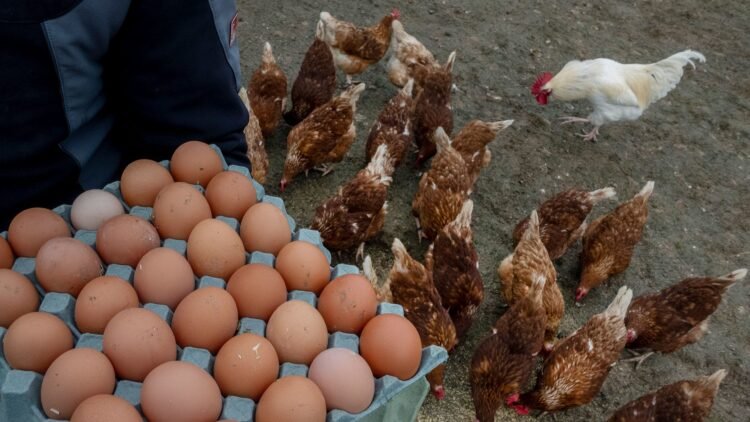SCHOENEICHE, Germany — Facing a severe egg shortage, the U.S. government is reaching out to European and international suppliers in an attempt to boost domestic supply and stabilize skyrocketing prices.
The U.S. Department of Agriculture (USDA) has approached multiple countries, including Germany, Italy, Poland, and Sweden, requesting egg exports to alleviate the crisis caused by a devastating bird flu outbreak. However, logistical and regulatory hurdles could complicate the process.
Regulatory Differences Pose Challenges
One of the biggest obstacles in securing European eggs for the U.S. market lies in the differing food safety standards between the two regions. In the U.S., eggs must be washed and refrigerated to prevent salmonella contamination. In contrast, European regulations prohibit washing eggs, as the natural protective layer on the shell is believed to prevent bacterial intrusion.
“These are fundamentally different systems,” explained Hans-Peter Goldnick, president of the German Egg Association. In many European markets, eggs are sold unwashed, and it’s not uncommon to find remnants of feathers or dirt on the shells at grocery stores.
Poland, one of Europe’s largest egg exporters, has also been in discussions with U.S. officials. However, Polish authorities are assessing whether their farmers can meet American safety and processing standards before making any commitments.
Limited Surplus and Domestic Demand
Even if regulatory barriers were overcome, European nations may not have enough eggs to spare. Many EU countries are already experiencing their own avian flu outbreaks, and with Easter approaching—a season of high egg consumption—the domestic demand for eggs is surging.
Germany, for example, produces only about 73% of the eggs it consumes and relies on daily imports from the Netherlands to meet demand. “We collect about 45 million eggs per day in Germany,” said Goldnick. “Meanwhile, the U.S. is facing a shortfall of around 50 million eggs per day. That shows just how challenging this situation is.”
Italy, another country the U.S. reached out to, is struggling with supply shortages due to bird flu outbreaks, making it difficult to contribute to American needs.
Processed Egg Products as a Likely Solution
Given the challenges of shipping fresh eggs across the Atlantic, powdered and processed egg products are emerging as a more feasible alternative. Unlike fresh eggs, these products are pasteurized, making them easier to transport while complying with safety regulations.
Poland’s poultry association has already informed the U.S. that it could supply significant quantities of egg powder and liquid eggs if export agreements are finalized. These processed products are commonly used in baked goods, pasta, mayonnaise, and food manufacturing.
Other European nations, including Denmark and Sweden, have also indicated they have limited ability to export fresh eggs but may be able to provide processed alternatives.
New Egg Suppliers and Market Improvements
Beyond Europe, the U.S. has already secured additional egg supplies from South Korea and Turkey. Brazil has also ramped up its egg exports to the U.S., increasing shipments by 93% in February compared to the previous year. However, concerns over Newcastle disease in parts of Brazil could limit its role as a major supplier.
Despite ongoing import negotiations, the U.S. egg market has begun showing signs of stabilization. The USDA reports that wholesale egg prices have dropped from a peak of $8.15 per dozen in February to $3.27 per dozen by late March. Consumers are starting to see those price reductions at grocery stores, though demand during Easter and Passover could drive prices back up temporarily.
Business Decisions Over Political Tensions
While trade tensions between the U.S. and the European Union have intensified under President Donald Trump—particularly over tariffs on steel, aluminum, and automobiles—European egg producers appear willing to do business if the price is right.
“The political landscape doesn’t change the reality of supply and demand,” said Goldnick. “I know producers who have said, ‘If the offer is good, we’ll sell.’ At the end of the day, this isn’t about governments—it’s about people who need eggs, whether in the U.S. or in Europe.”

 English
English



























































